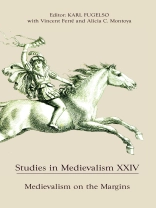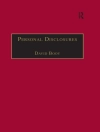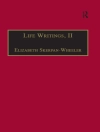Essays on the post-modern reception and interpretation of the middle ages.
This volume not only defines medievalism’s margins, as well as its role in marginalizing other fields, ideas, people, places, and events, but also provides tools and models for exploring those issues and indicates new subjects towhich they might apply.
The eight opening essays address the physical marginalizing of medievalism in annotated texts on medieval studies; the marginalism of oneself via medievalism; medievalism’s dearth of ecotheory and religious studies; academia’s paucity of pop medievalism; and the marginalization of races, ethnicities, genders, sexual orientations, and literary characters in contemporary medievalism. The seven subsequent articles build on this foundation while discussing: the distancing of oneself (and others) during imaginary visits to the Middle Ages; lessons from the margins of Brazilian medievalism; mutual marginalization among factions of Spanish medieval studies; and medievalism in the marginalization of lower socio-economic classes in late-eighteenth- and early nineteenth-century Spain, of modern gamers, of contemporary laborers, and of Alfred Austin, a late-nineteenth- and early twentieth-century poet also known as Alfred the Little. In thus investigating the margins of and marginalization via medievalism, the volume affirms their centrality to the field.
Karl Fugelso is Professor of Art History at Towson University in Baltimore, Maryland.
Contributors: Nadia R. Altschul, Megan Arnott, Jaume Aurell, Juan Gomis Coloma, Elizabeth Emery, Vincent Ferré, Valerie B. Johnson, Alexander L. Kaufman, Erin Felicia Labbie, Vickie Larsen, Kevin Moberly, Brent Moberly, Alicia C. Montoya, Serina Patterson, Jeff Rider, Lindsey Simon-Jones, Richard Utz, Helen Young.
Inhoudsopgave
Editorial Note –
Medievalism in the Margins: Paratexts and the Packaging of Medieval French Literature – Elizabeth Emery
Medievalism Studies and the Subject of Religion – Richard Utz
Pop Medievalism – Erin Felicia Labbie
Ecomedievalism: Applying Ecotheory to Medievalism and Neomedievalism – Valerie B. Johnson
Whiteness and Time: The Once, Present, and Future Race – Helen Young
A Desire for Origins: The Marginal Robin Hood of the Later Ballads – Alexander L. Kaufman
Women, Queerness, and
Massive Chalice: Medievalism in Participatory Culture – Serina Patterson
‘Constant inward looking, ‘ Medieval Devotional Literature, and the Concordium-Fruitlands Library – Vickie J. Larsen
Speaking of the Middle Ages Today: European and Transatlantic Perspectives – Vincent Ferré and Alicia C. Montoya
Echoes from the Middle Ages: Tales of Chivalry, Romances, and Nation-building in Spain (1750-1850) – Juan Gomis Coloma
Antiquarianism over Presentism: Reflections on Spanish Medieval Studies – Jaume Aurell
Medievalism and the Contemporaneity of the Medieval in Postcolonial Brazil – Nadia Altschul
The Middle Ages are within your grasp: Motor Neurons, Mirror Neurons, Simulacra, and Imagining the Past – Jeff Rider
Alfred the Little: Medievalism, Politics, and the Poet Laureate – Megan Arnott
Swords, Sorcery, and Steam: The Industrial Dark Ages in Contemporary Medievalism – Brent Moberly and Kevin Moberly
Modern-day Ring-givers: MMORPG Guild Cultures and the Influence of the Anglo-Saxon World – Lindsey Simon-Jones












